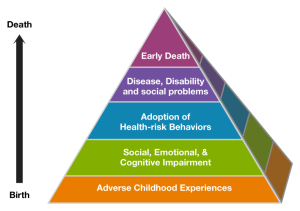A new approach to helping sexually abused children
The National Center for Trauma-Informed Care and Alternatives to Seclusion and Restraint, or NCTIC defines trauma-informed healthcare as “an approach to engaging people with histories of trauma (such as childhood sexual abuse) that recognizes the presence of trauma symptoms and acknowledges the role that trauma has played in their lives.”
What exactly is “trauma”? The Substance Abuse and Mental Health Services Administration, or SAMHSA, holds that “individual trauma results from an event, series of events, or set of circumstances that is experienced by an individual as physically or emotionally harmful or life-threatening and that has lasting adverse effects on the individual’s functioning and mental, physical, social, emotional, or spiritual well-being.”
Trauma caused by Childhood sexual abuse
Childhood sex abuse is a traumatic experience for any child. Even after a child molester is caught and put behind bars, and the child awarded restitution from the attacker and the institution who enabled the attacker, trauma lingers. Traumatic events in children’s pasts have a way of incurring lasting harm. Children who were sexually abused when they were younger are subject to a host of physical and psychological ailments later in life. Those ailments include guilt, shame, depression, anxiety, nightmares, sexual dysfunction, eating problems, somatic complaints such as recurring pain or headaches, even self-harm and thoughts of suicide.
 But parents of traumatized children can take heart. Organizations practicing trauma-informed healthcare understand trauma. And its long-term effects on mental health, and how to help your child recover from it. Staff at trauma-informed schools, hospitals, daycare centers, and other facilities are trained to spot the signs of trauma in children. And they bring the experience to take the necessary steps to provide children with the treatment they need to avoid re-traumatization.
But parents of traumatized children can take heart. Organizations practicing trauma-informed healthcare understand trauma. And its long-term effects on mental health, and how to help your child recover from it. Staff at trauma-informed schools, hospitals, daycare centers, and other facilities are trained to spot the signs of trauma in children. And they bring the experience to take the necessary steps to provide children with the treatment they need to avoid re-traumatization.
Defining Trauma-informed Healthcare
According to www.traumainformedcareproject.org, Trauma-Informed Care, or TIC is an organizational structure and treatment framework that involves understanding, recognizing, and responding to the effects of all types of trauma. Trauma-Informed Care also emphasizes physical, psychological and emotional safety for both consumers and providers. And it helps survivors rebuild a sense of control and empowerment.
Traditionally, educational institutions have used “seclusion, restraints, and other coercive practices” when dealing with trauma-induced mental or behavioral illnesses. Children who act out in class, stop coming to school, or are otherwise disruptive are expelled or suspended. But with the TIC trend on the rise, schools are incorporating knowledge of trauma into their operating procedures and bylaws. And taking steps to address the trauma rather than shun students.
The TIC framework promises to have enormous benefits for victims of childhood sexual abuse. School officials and teachers will be more sensitive to the needs of students who have undergone sexual abuse. And more forgiving of the behavioral symptoms which sometimes accompany this type of trauma. Steps are being taken to ensure that a variety of programs and treatment options are available for sex abuse victims. Thus resulting in providing the resources he or she requires to begin the healing process and prevent re-traumatization.
Call the Childhood Sexual Abuse Attorneys at Cerri, Boskovich & Allard
Let us help you stand up for your rights. If your child was a victim of childhood sexual abuse, please contact us to see if we can help you. We have the expert and financial resources required to get you the settlement you deserve. You don’t pay a cent unless we win. Call us at 408-289-1417.
 Latest News
Latest News














